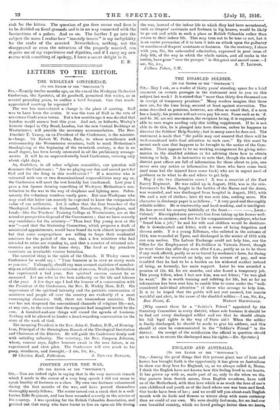THE DISABLED SOLDIER.
[To THE EDITOR OP THE " SPECTATOR.1 Sat,—May I ask, as a reader of thirty years' standing, space for a brief comment on certain passages in the statement sent to you on this subject last week ? It instated that " more than thirty-five thousand are in receipt of -temporary pensions." Many readers imagine that these men are, for the time being, secured at least against starvation. Tho sums described as pensions, however, are often so small that, if a man has a family, his pension will not even pay his rent. Sums such as 4s. -d. and 6s. 3d. are not uncommon, the recipient being, it is supposed, easily able to earn wages needing only this trifling supplement. If he is not able to do this, he is plunged into keen distress, unless he happens to discover the Soldiers' Help Society ; but in.many cases he does not. The statement is made that " the public may rest assured that there will bo well-considered indiv dual attention to each case." By this must be meant each ease that happens to be brought to the notice of the Com- mittee. There appears to be no working arrangement for giving infor- mation to the disabled soldiers or for advising them how to -obtain training or help. It is instructive to note that, though the windows of district poet offices are full of information for those about to join, -one never sees any notice or information for those who have come back (and none but the injured have come back) who are in urgent need of ,guidance as to -what to do and where to •get help.
May I cite two illustrative cases ? X was a reservist of the East Surrey Regiment. He was called up in August, 1914, was in the aein- forcements for Mons, fought in the battles of the Marne and the Aisne, was wounded, and was discharged from hospital in August, 1915, with 10s. and a suit of clothes ; later £1 was sent him, nothing more. His character in discharge paper is as follows " A-very good and thoroughly reliable soldier. He is trustworthy and hard-working, and is intelligent He has served his country faithfully at the front.— — Lieut.- ColoneL" His crippled arm prevents him from taking up his former well- paid work as carman; and but for his compassionate employer, who has "found him a job," he and his wife and children would be destitute. He is downhearted and bitter, with a sense of being forgotten and thrown -aside. Y is a young Rifleman, who enlisted in the autumn of 1914, was wounded at Ypres, and discharged in the winter of 1915 with one arm useless. The Labour Exchange could not help him, nor the Office for the Employment of Ex-Soldiers in Victoria Street, though he went there day after day soon after 6 a.m., partly so as to be there if any work offered, partly so as to travel by workmen's fares, for during -several weeks lie received no help, nor his arrears of pay, and was troubled that he had to be a burden -on his widowed -mother instead of ,being, as formerly, her main support. Later he was awarded a pension of 12s. 6d. for six months, and -also found a temporary job. This young fellow, when I last saw him, was not hitter; "he was glad he went." He is worth training and refitting for life, but so far no information has been sent him to enable him to come under the "well- considered individual attention " of those who arrange to help him. It is to be hoped that the public will not rest assured, but remain watchful and alert, in the cause of the disabled soldier.—I am, Sir, &c.,, [Why cannot there be a " Soldier's Friend " appointed by the Statutory Committee in every district, whose sole business it eleauld- be to find out every discharged soldier and see that he should obtain his full legal rights in the way of State aid ? When the soldier is finally discharged, he should be made to give his address, and this should at once 'be communicated to the '" Soldier's Friend " in the district. On receipt of the notification the official in question-should set to work to secure the-discharged man his rights.—ED. Spectator.]






























 Previous page
Previous page